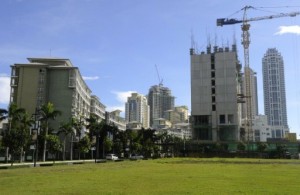Growth of FDIs seen to slightly pick up in ’12

Photo taken November 12, 2011, shows the Bonifacio Global City skyline in Taguig, Metro Manila. Foreign direct investments to developing economies like the Philippines may slightly pick up in 2012 and start growing rapidly by 2013. AFP PHOTO/JAY DIRECTO
Foreign direct investments being channeled to developing economies like the Philippines may slightly pick up in 2012 and accelerate over the medium term.
According to a report titled “World Investment and Political Risk,” challenges confronting the global economy, including the debt crisis in the eurozone, may moderate the growth in FDIs to developing countries next year.
According to the report, which was published by the Multilateral Investment Guarantee Agency (MIGA), a unit of the World Bank Group, FDIs to developing economies will start growing rapidly by 2013.
Next year, FDIs to developing countries may grow moderately from the $507 billion registered in 2010.
In 2013, foreign direct investments may hit a new record of $660 billion. The record level of $614 billion was reached in 2008.
“High economic growth [even if moderating], rising domestic demand, improving investment environments and infrastructure, and more attractive cost-productivity factors are expected to continue, rendering developing countries attractive locations,” the report said.
Given the debt crisis in the eurozone that is expected to continue next year, as well as the weak performance of the US economy, the report said, developing countries will become more attractive locations for FDIs. However, the report also said the ability of developing countries to attract FDIs partly hinge on their efforts to solve domestic factors that serve as investment constraints.
In the case of the Philippines, net inflows of FDIs amounted to $810 million in January to August this year—down by 19 percent from $1 billion reported in the same period last year.
Government officials said the decline was due partly to uncertainties in the global economy that reduced risk appetite of investors.
But according to economists, the drop in FDIs to the Philippines—while investments have reportedly grown by a modest pace in other developing countries—shows there are domestic factors that tend to discourage investors from placing their funds in the Philippines.
According to the MIGA report, domestic factors that serve as the biggest constraints to FDIs, as far as developing countries are concerned, include insufficient infrastructure, political and regulatory risks, lack of access to financing and qualified labor and potential macroeconomic instability.
In the case of the Philippines, regulatory risks, insufficient infrastructure, and the tedious process of putting up a business are the usual factors cited by economists.
On risks, the report said foreign investors have expressed concern over actual cases of regulatory changes in the past that had adversely affected foreign investments—something that could deter the inflow of investments.
“MNE [multinational enterprises] concerns over governmental actions that negatively affect their investment are well grounded in reality,” the report said.
The report said that addressing the concern of regulatory stability will be one way to help developing countries gather more FDIs over the medium term.
